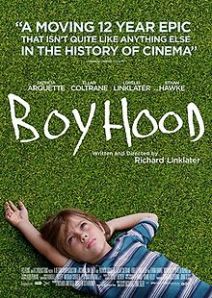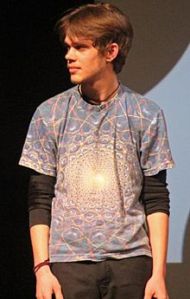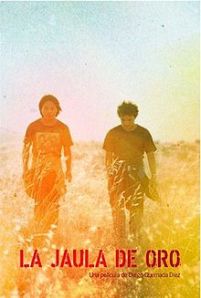
The invitation came more by chance than anything else. Max was angling to borrow Adam’s trainers for the umpteenth time, when Josh put his head around the door.
“We’re going to Brighton tomorrow. You want to come?”
“Mebbe,” said Max. “Who else is coming?”
“Dylan, Isabel, Ellie.”
Adam listened intently, hardly daring to meet Josh’s eye. Then, as if Josh had actually heard the question blaring unspoken in his mind, “You can come too if you like.”
“Yeah, OK,” he said as nonchalantly as he could manage.
At home, his mother was less than delighted. “I don’t know, Adam. You’re still only fourteen. How are you going to get there?”
“Tube to Victoria, then the train to Brighton. I won’t do anything stupid, I swear.”
“What time will you be back?”
“Six. Seven at the latest. Max says there’s loads of trains.”
“I was rather hoping the two of us could go shopping tomorrow. We could have tea at Hattie’s Cake Place afterwards, with scones and clotted cream and that lovely plum jam they have.”
“Please, mum.” Adam could hear the edge of desperation in his voice. He noticed his mother turn away.
“I suppose you’re far too grown-up these days to be seen out with your mother.”
“It’s not that. We can go shopping on Sunday instead if you like.”
A pause and a sigh. “You say Dylan’s going? I suppose I could give Jan a call, see what she thinks.” Relief flooded over Adam.
“Thanks, mum!”
The next day, he was up at seven. First he put on his Nike T-shirt and jeans. Then he tried the Arsenal shirt his uncle had given him for Christmas. Surveying himself in the mirror, it occurred to him the Arsenal shirt might lead to a discussion about football and that he might be forced to admit that, despite repeated requests, he’d never been to a single game. Better to stick to the Nike shirt, but with chinos, he decided, not jeans. Using the pointed end of a toy space rocket, he prised the bottom off his piggy-bank and tipped his life savings onto his bed. It added up to a grand total of twenty-seven pounds and fifty-nine pence. Adam scooped his treasure trove into his pocket and went downstairs.
In the kitchen, his mother was wrapping sandwiches in tin foil. “I’ve done you two ham, and one cheese. That should keep you going.”
“I don’t need all that stuff. Honestly.”
“I’m not having you stuffing yourself on junk food all day. I’ve put the sunscreen in your bag, and three bottles of water.”
“Mum…”
“Is your phone fully charged?”
“Yes! And I don’t need sunscreen either.”
“Yes you do. Don’t forget it isn’t too late for me to change my mind!”
“OK, OK.”
During breakfast, Adam tried his best to convince his mother he didn’t need a lift to the station, but she was having none of it. As they drew up, he was relieved to see Max being dropped off too.
“You don’t have to wait.”
“All right, I get the hint! Hey, aren’t you going to give your old Ma a kiss good-bye?”
Adam gave his mother a hurried peck on the cheek and hopped out of the car before she could do or say anything further. “See you tonight!”
At Victoria, it turned out Max was right; there were plenty of trains to Brighton. While the others were buying their tickets, Adam took advantage of the opportunity to dump his mother’s picnic in a greasy, overflowing bin next to a takeaway coffee kiosk. He turned round to find Ellie watching him, a mocking half-smile on her face. He blushed, unable to could think of anything to say.
On the train, he found himself sitting next to the window with the five others squashed in around him. A steady flow of banter batted back and forth, mostly concerning games scores, football matches and a boy called Finn who’d been sent out of Maths for farting.
“So what’s the plan?” said Dylan as the train pulled out of East Croydon.
“Dunno. Just hang out I s’pose. Mebbe go down the pier.”
“How much money you got?”
“Tenner. You?”
Dylan just shrugged.
“I’ve got twenty-seven quid.” It had tumbled out of Adam’s mouth before he’d had time to think. Now the other kids were staring at him.
“Fuck me,” said Josh. “In that case you can get the beers in!”
“Vodka!” said Max. “Let’s get a bottle of vodka!”
The girls sniggered, but their eyes were bright with excitement. “You wouldn’t dare!”
Adam fell silent and chewed a fingernail as the other kids started debating excitedly about how they might dupe a shopkeeper into selling them vodka. At Christmas, his mum had let him have a sip of champagne, but he’d never so much as tasted anything stronger.
“You should do it,” said Josh, turning to Adam. “You’re the tallest.”
“Yeah, and you’re the one with the money.”
Now all eyes were on Adam. Ellie’s gaze fastened on his, the same half-smile playing on her lips. Adam thought he detected a glimmer of scorn.
“Yeah, all right.”
The first two shops they tried were non-starters; brightly lit, with the spirits kept on shelves behind the till. Adam was loitering by a shelf stacked with sweets and bars of chocolate in the second one when he realised the others had come in behind him. Dylan picked up a four-pack of Heineken from the fridge. Within a second, a security guard was tapping his shoulder and pointing out a sign explaining that no alcohol would be sold without appropriate ID. The kids tumbled out onto the pavement, screeching with laughter. A few paces down the street, Max opened his jacket to reveal a bottle of coke.
“That’s no good.”
“It’ll go with the vodka, you numpty.”
“You’ve got a nerve, with the security bloke standing right there and everything.”
“Piece of cake.”
“No-one’s gonna sell us vodka,” said Ellie plaintively. “The only way to get it is to nick it.” Again all eyes turned to Adam.
“Come on Adam. You said you’d get it.”
“Yeah, you promised.”
They chose a place down an alley not far from the seafront – dark, run-down with an elderly Pakistani man alone at the till. “I’ll go in first. See if I can distract him,” said Josh. Adam’s mouth went dry. He could feel sweat gathering on his upper lip. The next second, his phone bleeped. “Let me know when you arrive. Love you. Mum xx.” Adam quickly slipped the phone back in his pocket. He could hardly bear to think of his mother waiting in trusting ignorance at home.
Through the window, Adam could see Josh pointing up at an oversized birthday card on a top shelf at the back of the shop. He watched as the proprietor pulled out a small step ladder and put his foot on the first step.
“C’mon, fam. It’s now or never,” Max urged at his elbow.
Adam took a deep breath and stepped inside the shop. Over the door, a brass bell gave a merry tinkle.
Adam could see rows of whiskey, rum and brandy on the shelf by the till. He looked up and down for vodka but there didn’t appear to be a single bottle. The shopkeeper was handing the card to Josh, who cast a quick ‘do it now’ glance in Adam’s direction. He wiped his palms on his trousers and then quickly grabbed a bottle of Bacardi and charged out of the shop as fast as his legs would carry him. A second later, Josh crashed out onto the street, making the doorbell tinkle alarmingly. Shrieking and cackling, the kids took off in the direction of the seafront, oblivious to the outraged yells of the shop-keeper retreating behind them. As soon as they were out of reach of the shop, they slowed to a dawdle, and the lads took turns to clap Adam on the back.
“Hey, man. That was epic.” To Adam’s surprise, there was genuine admiration in their voices. Even so, his heart was still racing. With a fresh thrill of anxiety, it belatedly occurred to him the shop might have been equipped with CCTV. He cursed himself for not having thought about it until now.
“Put it in here.” Ellie rewarded Adam with a quick smile of complicity, as she held her bag open. “Don’t want the feds getting nosy, know what I mean.” Adam handed it over with more relief than he’d have liked to admit to.
Down on the beach, the kids settled down with their backs to a decaying breakwater and gorged themselves on slices of cold, greasy pizza from a stall near the bandstand.
“So lemme see it,” said Josh.
Ellie opened her bag and handed him the Barcardi. He unscrewed the cap, took a gulp and swallowed with a theatrical gasp of satisfaction. Next it was Max’s turn. He took a sip, pulled a face and spat it out. “You should have got vodka.”
“Yeah right. Like you’d know the difference.”
Then Ellie grabbed the bottle and gulped a couple of inches straight down.
“Hey, leave some for the rest of us, you pisshead!” Josh passed the bottle to Adam. “Get that down you, bro.”
Adam wiped the lip of the bottle and put it gingerly to his mouth. He took a small sip. The rum tasted sour and produced a hot, burning sensation at the back of his throat. “Go on! Put some proper hair on your chest.” The girls smirked. Adam could see Ellie whispering to Isabel from behind her hand. He took a second, larger swig. This time, he could feel the rum burning all the way down to his stomach. For a second, he thought he might throw it straight back up. He became aware of his phone buzzing; his mother again. Shutting off the call, Adam put the phone on mute and stuffed it back in his pocket.
He was beginning to feel a bit dazed. To his left, Max had somehow got Dylan in an arm-lock and was pummelling the smaller boy’s torso, his face alight with violent intent. At the same time, in an ungainly ballet of lunges and stumbles, Dylan was trying to push Max off balance by catching his foot and jerking it out from under him. Sprawling on the beach nearby, the girls giggled uncontrollably. Adam noticed a smear of ketchup staining Ellie’s carefully applied make-up. All of a sudden, Max crashed to the ground in a crunch of pebbles, landing full square in the middle of a pizza. Dylan gave a hoot of triumph. “Yesss! I won!”
“Shit, now look what you’ve done!” said Max, wiping tomato puree off his jeans. He aimed an indignant kick at Dylan’s knee, but Dylan, always nimble, dodged smartly to one side and Max once again found himself scrabbling on the ground. Everyone else exploded with laughter.
“It’s not funny, bloody hell!”
Adam was still wiping tears from his eyes when Isabel gave a sudden shriek of panic. Unnoticed by all, a seagull had landed a foot away and was gobbling down discarded pizza crusts; several others were circling overhead.
“Get them away! Get them away from me!”
Isabel gave way to hysterical sobbing. Adam was surprised at how large the gulls were close up. Without pausing to think, he picked up the empty Bacardi bottle and pitched it at the feasting birds with all his might. It landed right in their midst, fracturing into a mass of glittering shards and causing the birds to lumber squawking into the air.
“Goal!” yelled Dylan, and was overcome with a fresh wave of hilarity. Adam leapt to his feet and chased after the gulls, all the while screaming like a demented dervish and flapping his arms as if he might very well pursue them into the air.
“You all right?” he said, turning to Isabel.
“Yes, thanks,” she replied and gave him a look of unexpected gratitude. Adam smiled. He could sense Ellie watching him.
“C’mon. Let’s go to the pier.”
“Yeah. Good idea.”
Adam was surprised at how much the rides cost. He’d hoped to have a little money left over to take home, but even after pooling all their resources, they’d only be able to afford go on one or two at the most.
“Let’s go on the Booster.”
“No Crazy Mouse, Crazy Mouse!” Under normal circumstances, Adam would have avoided the roller coaster at all costs. The prospect of being shuttled at vertiginous speed up and down and upside-down along the length of the ride and out over the sea, filled him with dread. Feigning enthusiasm, he joined the queue behind Josh, while secretly marvelling that Isabel could be terrified of gulls, but perfectly sanguine about going on Crazy Mouse.
Before he knew it, an attendant was strapping him in and checking the bolts on his carriage. Adam wondered if it wasn’t too late to change his mind. Initially, the rum had made him feel unsteady and not fully in control of himself; now, combined with the sun overhead, it was beginning to make his head pound and an unpleasant acrid aftertaste filled his mouth. He hoped to God he wouldn’t be sick. Just as this thought occurred to him, Ellie vomited copiously, in the carriage in front.
“Out! Out of there this second!” said the attendant, unlocking the car, his face blazing with fury.
“But I’ve paid and everything,” Ellie protested half-heartedly.
“Bloody kids – look at this filthy, disgusting mess!”
Adam leapt at his chance. “Hey. I’ll wait with you if you like.”
“Oh. OK. That’s really nice of you.” Adam signalled to the attendant to let him off the ride. For a second, he considered asking for a refund, but the man’s thunderous expression made him think better of it. In his pocket he still had a few tokens left.
Adam and Ellie sat down on a bench a little further along the pier. A cool breeze blew in from the sea, making him feel slightly less nauseous. Distant shrieks from the roller coaster reached them intermittently as the carriages barrelled along the winding track. Ellie sat hunched over, her long, dark hair flopping over her thin cheeks. Beneath the veneer of make-up, Adam could see the pallor of her skin and the blue veins running along the base of her throat. Surreptitiously, he crept his arm along the back of the bench behind her and let his hand rest ever so gently on her shoulder.
“You feeling all right now?”
“Yeah. Could you get me a bottle of water or something?”
“Sure.” Adam got up. He remembered they’d passed a bank of drinks machines on the way in. He fished for his last couple of pounds in the bottom of his pocket, slotted them into the machine and bent down to withdraw a bottle of Evian.
“Here.” Ellie unscrewed the bottle and drank avidly.
“You want some?” Adam took the bottle and swallowed a few mouthfuls of icy water. A little further up the pier, he could see some younger boys and their dads whirling around on the dodgems. Hearing their delighted shrieks, he filled with an overwhelming desire to join them and race around the arena in one of the little electric cars, swerving this way and than and not minding who he bumped into. His mum had never let him go on the dodgems and as for his dad, Adam never even met him. Paying no heed to the voice in his head telling him he was far too old to want to go on such a childish ride, he decided it was now or perhaps never. “You wanna go on the dodgems?” he asked Ellie. “I’ve still got a few tokens.”
“Nah, you’re all right. You can go if you want.”
“You sure you don’t mind?”
Ellie shrugged. “Why should I?”
“I won’t be long. It’s just I’ve never tried it before.”
Adam approached the booth and handed over the last of his tokens. Two minutes later, he was trying to fold his legs into a blue buggy with a large number six painted in black on its bonnet. “Don’t forget you have to wait for the ride to end before you get out, OK.”
“OK.” He pressed the accelerator. The little car jerked into action, then shot off across the arena at top speed. Adam ran into the wall several times before getting the hang of the steering wheel. He tried to catch Ellie’s eye and gave her what he hoped was a jaunty wave. He was beginning to get control now and managing to make complete circuits of the arena without coming to grief. All at once, he noticed Josh, Dylan, Max and Isabel strolling towards Ellie, laughing and chattering nineteen to the dozen. They must have finished on roller coaster.
Adam watched helplessly as Ellie linked her arm with Isabel’s and all five of his friends sauntered off in the direction of the exit. He tried to yell above the sound of the music blaring out from loudspeakers hanging from the canopy over the arena, but either they didn’t hear, or couldn’t be bothered to turn around. Adam tried to angle the car so he could keep the others in view, but it was impossible. Two other vehicles crashed into him in short succession, and by the time he had regained control, Isabel, Ellie and the others had disappeared from sight.
It took what seemed like an age for the dodgems to come to a halt. Adam clambered out of his car as quickly as he could. He took off along the pier, searching with growing desperation behind stalls and kiosks, in the saloon and everywhere else he could think of. He decided to call Dylan. He felt in his pocket for his phone. Nothing. His heart sinking, Adam realised it must have fallen out pocket somewhere between the beach and the pier. He tried to suppress a rising tide of panic.
After a moment of deliberation, he set off at a trot along the seafront in the forlorn hope that he might stumble across the others by chance. Surely they hadn’t just forgotten about him? Or had they? It occurred to him that the whole outing was just an elaborate trick to catch him out. He tried to quash this thought as soon as it arose but it lingered stubbornly in the back of his mind. A clock on the façade of an ornate, seafront hotel read half past five. He couldn’t believe how fast the afternoon had slipped away. With a lump in his throat he realised his mum would soon be expecting him home.
On reaching the bandstand, Adam slowed to a halt and tried to decide if he redouble his efforts to find the others, or cut his losses and try to get home on his own. With a heavy heart, he turned away from the beach and starting making his way towards where he was certain the centre of town should be. He walked along several streets, turning first right and then left. There was no sign of the station. As he went on, the streets began to have a run-down, delapidated air; each house had multiple doorbells in a strip by the door. Adam realised he had no choice but to ask for directions.
The first person he came across was a steely-faced young woman pushing a buggy with a grubby toddler squirming and grizzling within the straps. In response to Adam’s timid ‘Excuse me’ she scowled darkly and pushed past him without uttering a word. As he watched her departing back, hot tears pricked at the back of his eyes. He sat down on the wall of someone’s garden.
Suddenly a group of men turned the corner and began heading down the street. One had a fierce looking cross-bred terrier on a lead and was having difficulty controlling it. The others appeared to be embroiled in some sort of argument. Adam got to his feet and cleared his throat. He was on the point of raising his hand when the dog snarled menacingly and made a lunge for him. Adam cowered against the wall. The man with the dog gave a vicious jerk of the lead. “Don’t look at my dog, you fucking eejit.”
Adam was still trembling as they turned the corner and disappeared from sight. In despair, he sank down onto the pavement and allowed himself to sob like a child.




